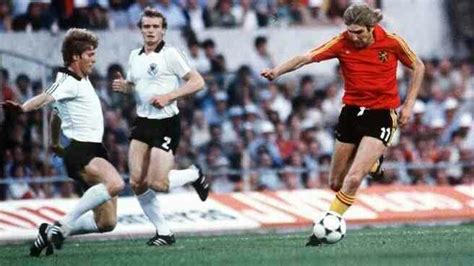In the heart of Italy, during the sweltering summer of 1980, an underdog story unfolded that would etch itself into the annals of football history. Belgium, a team not widely expected to make waves in the UEFA European Football Championship, embarked on a journey that would not only defy expectations but also unite a nation in pride and joy.
The Belgian squad, known as the Red Devils, arrived in Italy with a quiet determination. Back home, fans gathered around televisions in cafes, homes, and public squares, their anticipation mixed with a realistic understanding of the monumental task ahead. Belgium had not been considered serious contenders by many pundits, who favored the footballing powerhouses of West Germany, Italy, and England. Yet, the Belgian team harbored a belief in themselves, fueled by a blend of seasoned veterans and youthful talent, ready to challenge the status quo.
Their campaign began modestly, with draws that neither promised glory nor spelled doom. Yet, as the tournament progressed, something remarkable happened. The team started to gel, finding a rhythm and confidence that belied their underdog status. Each player seemed to elevate their game just when it mattered most, led by their inspirational captain, who rallied his troops with impassioned speeches and lead-by-example tenacity on the field.
The group stages saw Belgium advance against the odds, setting up a semi-final clash that would test their mettle like never before. The match was a tense affair, with Belgium absorbing pressure and striking on the counter. Their defense, disciplined and resolute, repelled waves of attacks, while their midfield orchestrated plays with precision and flair. When the final whistle blew, Belgium had secured their place in the final, a feat that sent shockwaves back home and across Europe.

The final in Rome’s Stadio Olimpico was set against West Germany, a team with a storied history and a reputation for winning when it mattered most. The Belgian fans, many of whom had traveled to Italy to witness this improbable run, filled the stadium with chants and songs, their red jerseys a stark contrast to the sea of German flags.
From the outset, the match was a David versus Goliath encounter. West Germany dominated possession, their experienced players controlling the tempo and probing the Belgian defense for weaknesses. Yet, Belgium was resolute, defending with heart and launching counterattacks that kept the German defense honest. As the match wore on, Belgium’s confidence grew, their play becoming more fluid and daring.
The breakthrough came in an unexpected moment of brilliance. A Belgian midfielder, seizing on a loose ball, unleashed a shot from distance that arced towards the German goal. Time seemed to slow as the ball sailed through the air, eventually nestling in the back of the net to the disbelief of players and fans alike. Belgium had taken the lead against the run of play, and the stadium erupted in joy.
However, the lead was short-lived. West Germany, true to their pedigree, responded with determination, leveling the score before taking the lead with a well-executed set piece. Despite Belgium’s valiant efforts to find an equalizer, the match ended in favor of West Germany. Yet, as the final whistle blew, the Belgian players did not hang their heads in defeat. Instead, they embraced, proud of their journey and the unity they had fostered.
Back in Belgium, the team’s return was met with a heroes’ welcome. Thousands lined the streets, cheering and waving flags, celebrating not the silver medal, but the spirit, determination, and unity the team had displayed. The Red Devils had not only exceeded expectations but had also captured the hearts of a nation.
The 1980 UEFA European Football Championship would be remembered not for the scoreline in the final but for the remarkable journey of an underdog team that dared to dream. Belgium’s run to the final was a testament to the unpredictability of football and the enduring allure of the underdog story. In homes and bars, stories of the tournament would be told and retold, each recounting adding to the legend of the team that united a country and performed beyond their wildest dreams.
For the players and fans alike, the silver medal was a symbol not of second place but of courage, unity, and the indomitable spirit of Belgian football. It was a victory in its own right, a triumph that transcended the confines of the sport to become a cherished chapter in the nation’s history. The legacy of Belgium’s 1980 team would live on, inspiring future generations to dream big and defy expectations, reminding everyone that sometimes, being an underdog is not a disadvantage, but a badge of honor.